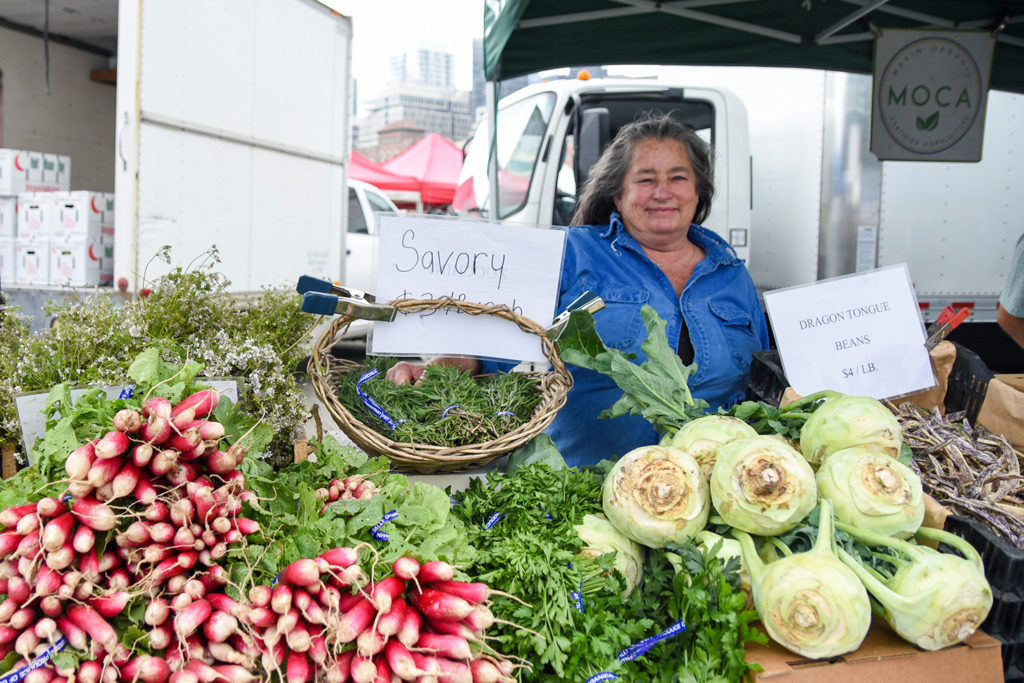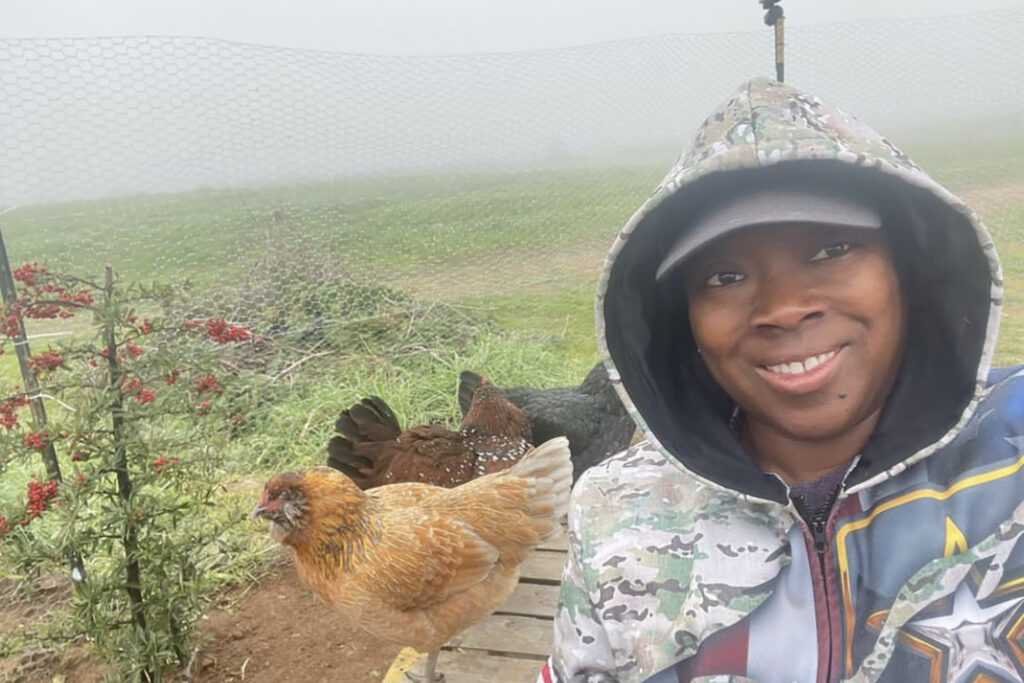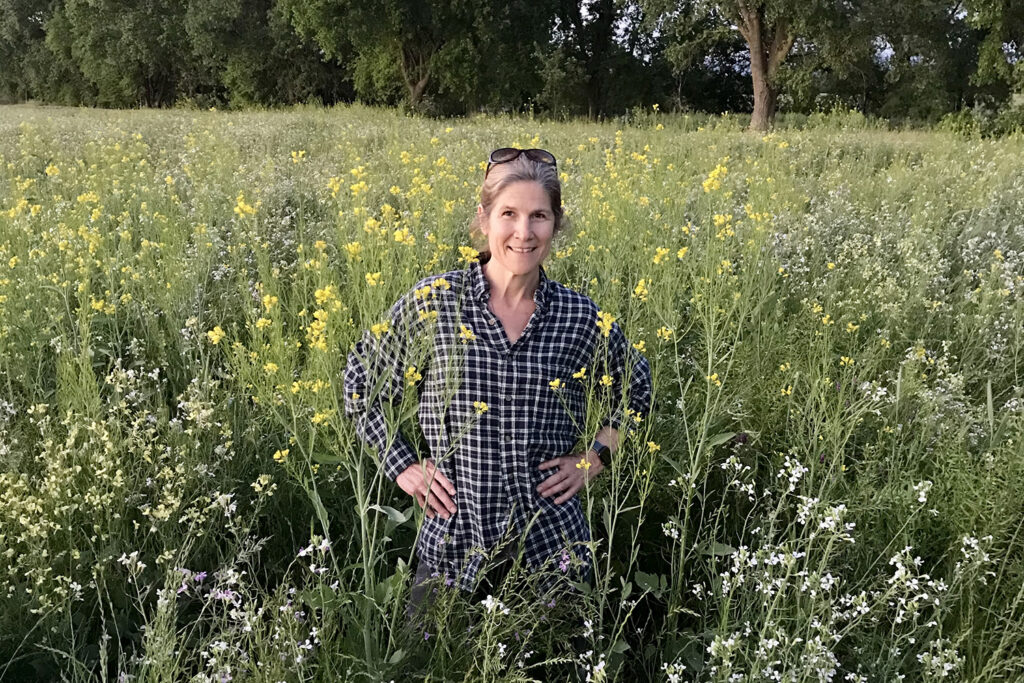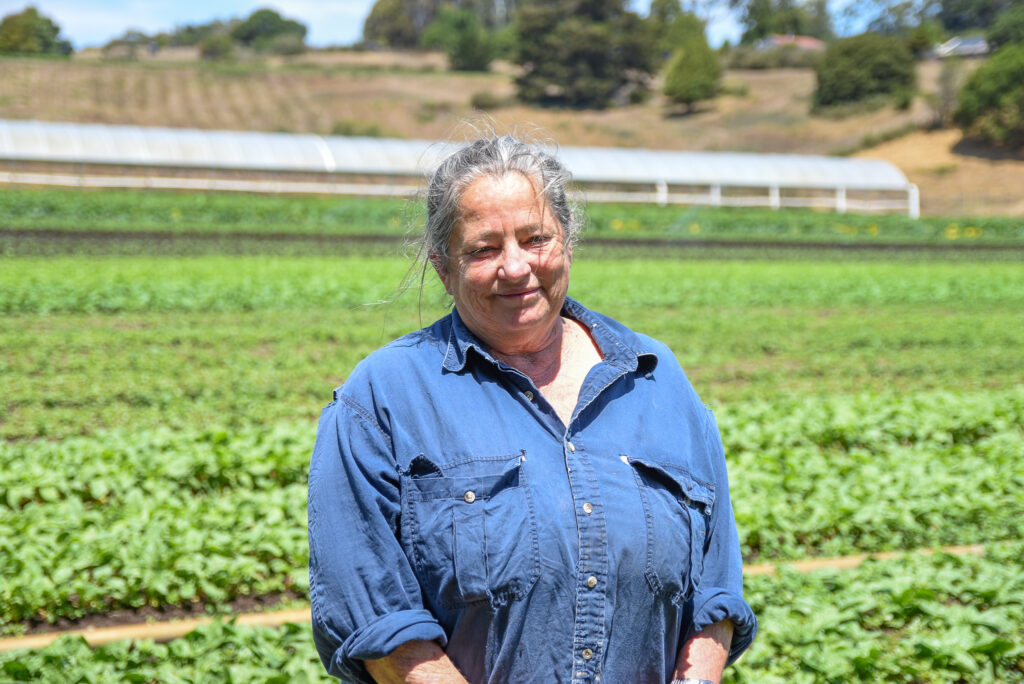Women Farmers in Sustainable Agriculture Share Words of Wisdom for Women’s History Month 2024
Selina Knowles, Communications Coordinator
February 29, 2024

During Women’s History Month, we’re celebrating the deep-rooted and ongoing contributions of women in agriculture. There are 1.2 million women producers in the United States, and according to the United States Department of Agriculture, 41% of beginning producers are women, and more than 28% of farmworkers are women. This week, we’re spotlighting a few sustainable women farmers in the Ferry Plaza Farmers Market who share why they farm, what they’ve learned, and their hopes for future generations of women farmers.

Priscilla Lucero, Lucero Organic Farms
Priscilla Lucero manages Lucero Organic Farms with her husband, Curtis. On the farm in Galt, they are creating a sustainable, biodiverse farm that encompasses the entire ecosystem. While Lucero Organic Farms is out for the winter season, when they return to the Ferry Plaza Farmers Market on Saturdays this spring, they’ll have strawberries followed by a range of summer fruits and vegetables, including tomatoes, okra, and more. Priscilla also serves on the Board of Directors for the Agricultural Institute of Marin.
How did you get started farming?
My grandfather was a sharecropper, so I guess it was in my blood. My mom had a garden while I was growing up, and my oldest sister and myself—I’m four out of six—were the only ones that have always been interested in gardening. I started my first garden when I was 12. Otherwise, I never considered farming.
Then, I met Curtis in 1998. After he retired from the military, his dad invited us back to the farm. I thought of it as, “Okay, you’re going to farm, I’ll do daycare.” But when we got here, I started doing the farmers markets with Curtis’s dad, Ben, and his wife, Karen.
I went on to do daycare on the farm for a little while, and then in 2018, Curtis’s dad said, “I’m done farming. You guys need to find your own piece of land.” All of a sudden, we had to scramble. We bought the farm here in Galt in 2018, and I stopped doing daycare and it was like, “welcome to farming.” At first it was Curtis’ dream, and then it became our dream. Now, I couldn’t even imagine not doing what we do.
What do you love about what you do?
It’s the connection with the land, with nature, and with our customers. I tell people that we don’t go to church on Sunday, we farm. Being on the farm, you see a lot of work everywhere you go, but you have a satisfaction of, “Oh, I planted this then, now it’s producing, then I get to harvest it, and then I really enjoy doing the farmer’s market as well.”
What are you most proud of?
Two things. The one that we were the most proud of is that we were able to get our own piece of land. Curtis’s dad, for years, had leased land. When you lease land, you’re at the mercy of the landowner. Being able to have our own land, it was kind of a dream.
The second thing is that we were able to pay it off within seven years. It was extremely hard. It caused lots of arguments, but being able to do that in such a short period of time was a true testament of working really hard and grinding. That set us up in a position where Curtis’ dad was able to retire and we were able to go forward and do what we’re doing now.
What advice or hopes do you have for aspiring women farmers?
Connect to another woman farmer. They can offer expertise and give you advice on where to turn to as far as getting started, getting loans, connecting you with the right people through the farming community. No matter who you are, the farming community really does help each other out. It’s hard to be in your own little world and do it on your own. You do need to connect with other farmers as well.
Other than that, just don’t give up. There’s a lot of opportunities for women in general, and especially minority women. There are so many opportunities for grants and different types of assistance to get them into farming.

Raquel Krach, Massa Organics
Raquel Krach manages Massa Organics with her husband, Greg Massa. She recently completed her Master of Science degree in regenerative agriculture at Chico State. The Krach-Massas started farming on the Massa family farm in 1997, and they have since transitioned the farm to organic. They grow brown rice, almonds, and Satsuma mandarins, selling directly to consumers at the Ferry Plaza Farmers Market on Saturday.
How did you get started farming?
Part of it is because I married Greg, and part of it is because I went to grad school for agroecology. In undergrad, it was ecology, and that morphed into agroecology in my 20s. Greg did graduate school in botany, and we were both going to be ecologists and academics before we decided to be organic farmers instead with the family farm.
It was a transition, going from a theoretical context to an applied context, where we could experiment with running a farm based on ecological principles and do conservation work. We’ve now farmed for 20 years, consistent with that value system, experimenting with different methods to improve our yields and also create a more balanced system.
After 20 years, I did go back to school here at Chico State to get another graduate degree so that I could get back into research in a different way. At Chico State, we do more applied research. So, even though it’s academia, we’re doing all of our research on farms. Now, I’m both a farmer and a researcher.
What do you love about what you do?
We have amazing biodiversity that we live with. We have really good food that we get to eat. We were biologists and ecologists from the beginning because we like watching and learning about nature. We like learning how things grow, live, etc. Every single year when the rice sprouts or any seed sprouts in mass across hundreds of acres, it’s pretty exciting. Every year when the almond blossoms just explode, that’s amazing. Every year when the lambs start popping out and we have 100 lambs running around, that’s amazing. It sounds very cliche, but new life is pretty great.
What are you most proud of?
Personally, I am most proud of bridging what’s important to farmers with what’s important to research with what’s important to other people, not just consumers that eat our food, but beyond. We’ve gotten grants through the California Department of Food and Agriculture to implement climate-smart practices. Those are everyone’s tax dollars. For my research, I was able to show that the practices that we implemented using those funds were highly beneficial, increasing yields and increasing nutrition in the nuts. It was really nice to connect all of those stakeholders.
What advice or hopes do you have for aspiring women farmers?
I’m way more impressed with the women that are younger and more active than I am because they’re a lot more confident than I ever was. My advice is just to stick with it, and know that you belong here.

Annabelle Lenderink, Star Route Farms
Annabelle Lenderink runs Star Route Farms, the oldest continuously certified organic farm in California, with acreage in Bolinas and Thermal. Purchased by the University of San Francisco in 2017 to provide educational and research opportunities, the farm is known for its innovativeness and commitment to implementing economically, environmentally, and socially sustainable practices. At the Ferry Plaza Farmers Market on Saturdays, Star Route Farms brings a wide variety of seasonal and unique vegetables.
How did you get started farming?
I was a late starter. I didn’t start farming until just before my 30th birthday. Before that, I went to a cooking school in New Orleans, and as part of that schooling, I worked in restaurants. I became interested in farming because of that. At some point, I moved to California to actually get a job on an organic farm named Gospel Flat Farm, and that’s how I got to Bolinas in 1989. I then started at Star Route Farms in 1998.
My interest has always been in finding foods that people have maybe forgotten about or remember from their childhood, or it’s from their home country. I really like to connect people with the food that makes them feel at home.
What do you love about what you do?
You’re dealing with immediate stuff. Your plants are growing or they’re not growing, and there’s a lot of problem solving. It’s a whole, complete package. It suits me.
What are you most proud of?
I’m most proud to still be here, to still be farming, and that I still enjoy it. I’m going to be 65 this year, so I’m feeling that, but I’m not ready to quit. It’s a good life.
What advice or hopes do you have for aspiring women farmers?
My advice is to get a job farming, and start doing it. It’s the best way to learn.
What I would hope for the future is that there will be lots of small farms surrounding all the cities and that we can get our food that way. It’d be nice if it penciled out a little better for people, and more fair pricing would be good. We’re so blessed because we do have people that appreciate what we do. It’s a pretty rarefied atmosphere to be selling at the Ferry Plaza Farmers Market, where people know what they’re getting and they don’t mind paying for it. That’s not the case for a lot of farms. Not everybody gets to sell to this particular public. So, it’d be great if there was broader appreciation for small farmers, and especially organic farmers.
Support Star Route Farms, Massa Organics, and Lucero Organic Farms at the Ferry Plaza Farmers Market on Saturdays.
See more words of wisdom from women farmers here.
Topics: Celebrations, Farmers, Farmers market, Farms
